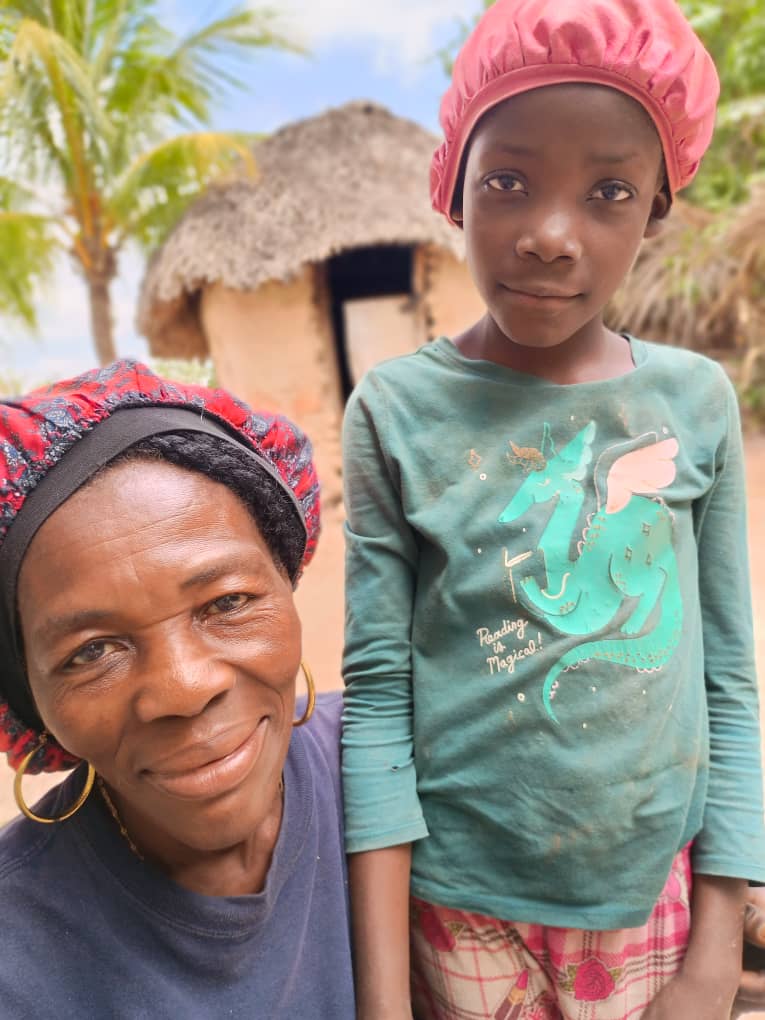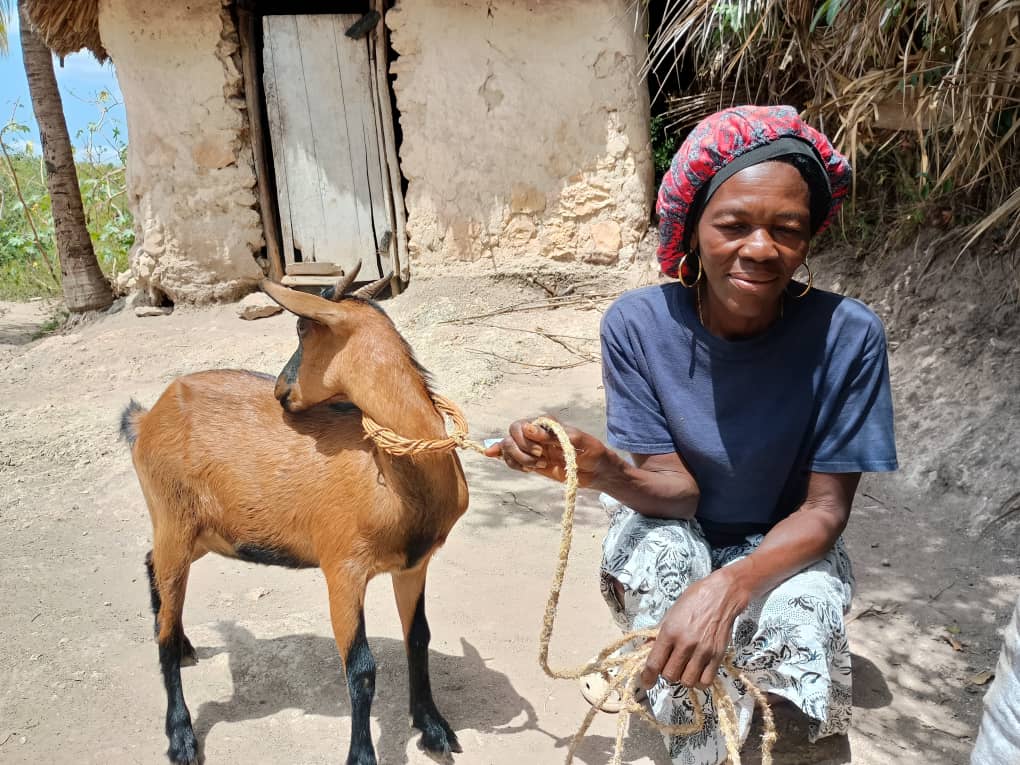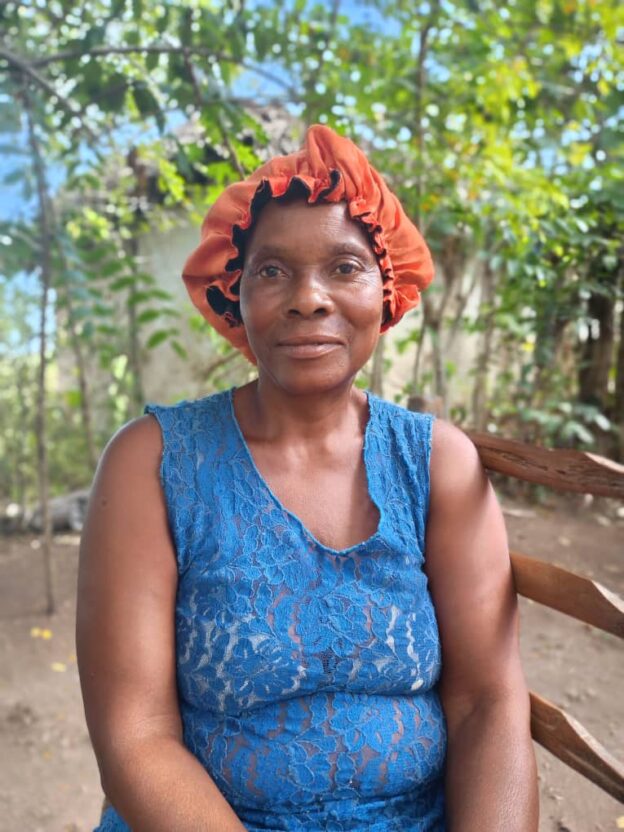Rosena Derima lives in the hills of northern Bedeyenn, the smallest of the four communes in Haiti’s lower Northwest. She was living with three daughters and a grandchild in a small, leaking, straw-covered shack. Her oldest daughter left the granddaughter with her shortly after the girl was born, and then she disappeared. “I haven’t heard from my daughter since. I guess I’m the girl’s mother now.”
Before she joined the CLM program, she fed the children by doing laundry for other families in the small nearby community of Dame or in one of the larger towns farther up the road to the north, Ma Wouj or Jan Rabel. She could make about 250 gourds, which is now just under $2, for a day’s work. If she was lucky, she would get two to four days of work in a week.
When her daughter-in-law was kicked out of the rented home she shared with her four kids. Rosena felt she had no choice but to invite them to join her, even if it was hard to imagine when everyone would possibly sleep. Now there are eleven in their tiny home.
She was anxious to start a business when she joined the program, so she used 750 gourds of the money that she received as her cash stipend, and she bought a sack of cooking charcoal. Charcoal production is one of the main sources of cash income in the Northwest. She borrowed a neighbor’s donkey, and she brought the charcoal for sale to Jan Rabel. She made a profit of 250 gourds.
When she had first spoken to her case manager about how she wanted to invest the business capital that the program would provide, she told him that she wanted to sell charcoal but also to buy and sell goats. As soon as she came back from her first experience selling charcoal, however, she changed her mind. “You can’t lose money with charcoal. Wherever you find profit, that’s where you have to stay.”
So she decided to throw all the 15,000 gourds she would get from her first CLM transfer of cash entirely into charcoal. She bought 20 sacks, and she has been bringing them to market two days a week as quickly as the she can. They sell well, and she has been managing her money carefully, always making sure that she can feed her kids but also that she can buy shares at the weekly meetings of her savings and loan association.
She even saved enough to buy a piglet from a neighbor whose sow had a litter. She got the piglet relatively cheaply — it cost just 3,500 gourds — because she paid before it was weaned. Now she’s waiting to take it home. A lot of pigs in her area died of Teschen disease in the last few years, and she knows that raising pigs is risky, but she decided to try anyway. “A pig can take me out of the hole I am in so quickly. If mine has a litter, there could be six or eight or ten piglets. That’s a lot of money.”
The thing most limiting her charcoal business right now is not having her own pack animals. Bringing charcoal to the market any other way would be too expensive, but her neighbor’s donkey can take just two, so that means it could take five weeks to sell all her charcoal. She will need to think about buying less merchandise next time and investing some of her capital in something else. But, for now, she is excited about how things are going. “I am not going to tear up my hands doing people’s laundry anymore.”

Alicil Fatil lives a few minutes away from Rosena. If you ask her, she’ll say that she is a mother of eight, though one of her eight children died very young. She gave away four of the others to be raised by other families because she could not take care of them. “I see them when I want to. They don’t live far. And they are all in school. I think they are doing well.”
She lives in a well-made cinderblock home with a good tin roof. But the house does not belong to her. She doesn’t even pay rent. It was built by a charity that worked in the area. It belongs to woman who’s since passed away. There was no one in it, and Alicil’s husband Ebert asked the late owner’s son whether he, Alicil, and her kids could use one of the rooms until they could find a place of their own. That was four years ago. “I am thirsty for my own home,” Alicil says. “When you live in someone else’s place you feel hemmed-in.” She shrinks her body noticeably as she says it, as if to demonstrate her problem.
She and Ebert now live in the home with her three remaining children and two of her grandchildren. Ebert is not father to any of them. But she likes the way he treats them. “Anyone would think that he’s their father. If I had known him at the time, I wouldn’t have had to send the other children away.”
Before they joined the CLM program, Alicil earned income by working in her neighbors’ fields. She’d generally make about 100 gourds for a half-day’s labor. Ebert contributed by making charcoal out of trees on his family’s land. But things had been getting harder and harder, because Ebert was becoming less and less healthy. He simply could not do all the hard work he was previously able to do.
When Alicil received her first cash transfer, she bought charcoal just as Rosena did. She bought a first sack, and when she sold it she bought another. She kept saving part of her profit to add to her capital, and soon she was buying four sacks at a time.
When she received business capital from the CLM program, she invested some into her charcoal business. This time, she bought a tree and hired some men to turn it into charcoal for her. She also invested part of her capital in the purchase of a goat. “I wanted a goat so that if something happens to my business I will have something I can sell to get started again.”

And Alicil has a goal. She is working hard to save money in her savings and loan association. She hopes that, by the end of the year, she’ll have saved enough to buy a donkey.
